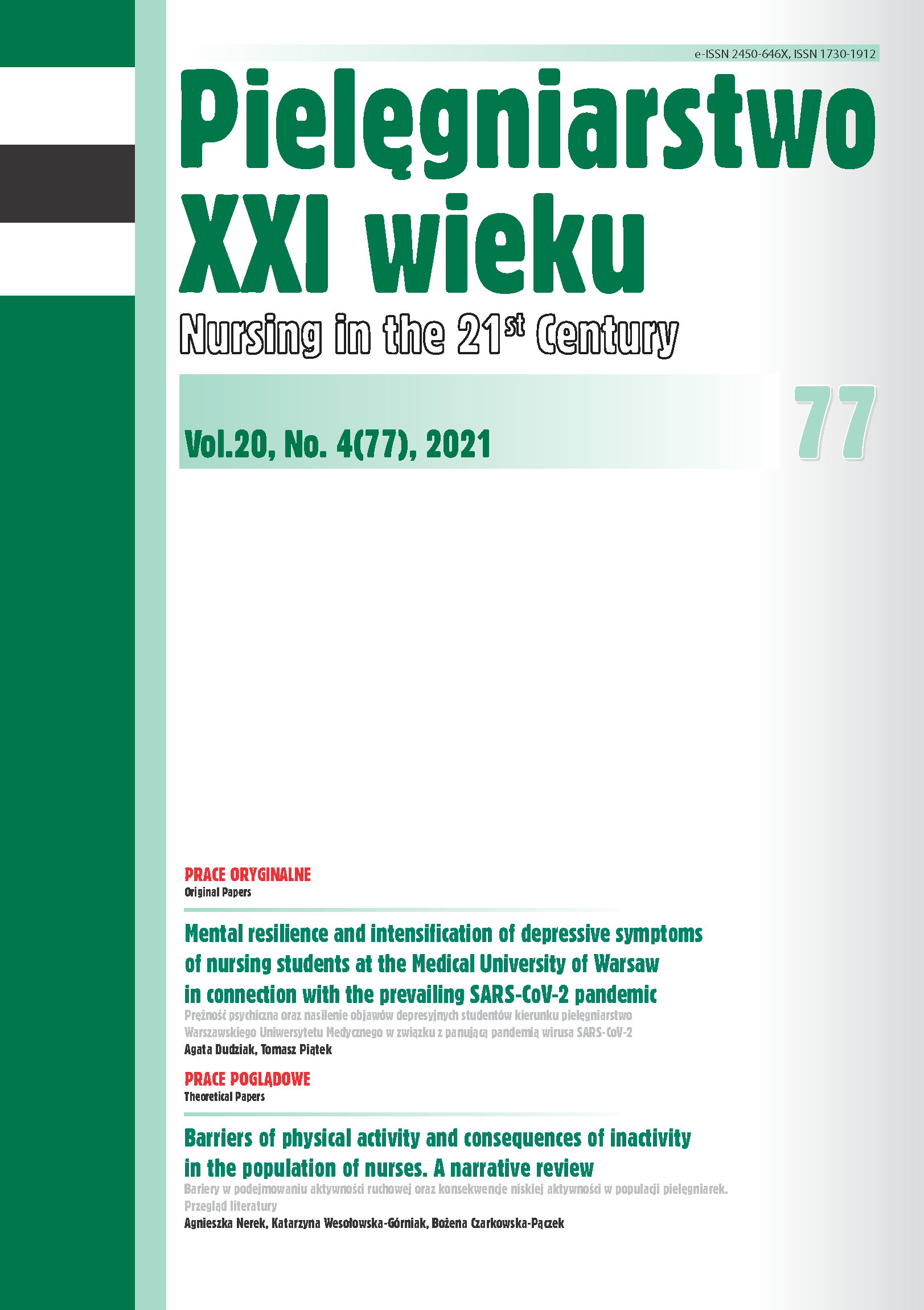Prężność psychiczna oraz nasilenie objawów depresyjnych studentów kierunku pielęgniarstwo Warszawskiego Uniwersytetu Medycznego w związku z panującą pandemią wirusa SARS-CoV-2
DOI:
https://doi.org/10.2478/pielxxiw-2021-0034Słowa kluczowe:
SARS-CoV-2, COVID-19, prężność psychiczna, pandemia, student, depresjaAbstrakt
PRĘŻNOŚĆ PSYCHICZNA ORAZ NASILENIE OBJAWÓW DEPRESYJNYCH STUDENTÓW KIERUNKU PIELĘGNIARSTWO WARSZAWSKIEGO UNIWERSYTETU MEDYCZNEGO W ZWIĄZKU Z PANUJĄCĄ PANDEMIĄ WIRUSA SARS-COV-2
Cel pracy. Celem pracy była ocena stanu prężności psychicznej oraz nasilenia objawów depresyjnych studentów kierunku pielęgniarstwo Warszawskiego Uniwersytetu Medycznego w czasie pandemii wirusem SARS-CoV-2.
Materiał i metody. W badaniu wzięło udział 130 studentów kierunku pielęgniarstwo Warszawskiego Uniwersytetu Medycznego, w wieku od 19 do 49 lat, średnia wieku wyniosła 24,3 lat. Do oceny stanu psychicznego i poziomu prężności studentów użyto zwalidowanych ankiet SPP- 25 oraz PHQ-9.
Wyniki. 44,6% (n=58) badanych uważa, że pandemia zdecydowanie wpłynęła na postrzeganie własnej osoby, a u 57,7% (n=75) studentów zaobserwowano zdecydowany spadek motywacji do działania. U 53,1% (n=69) pandemia miała zdecydowany wpływ na ich relacje z innymi ludźmi. Prawie trzy czwarte badanych zanotowało zdecydowany wpływ pandemii na życie codzienne.
Wnioski. Poziom prężności jest powiązany negatywnie z różnymi aspektami życia, im większy jest jej poziom, tym mniejsze zmian badani zaobserwowali w różnych obszarach życia. Osoby które chorowały na COVID-19 cechują się wyższym poziomem depresji i niższym poziomem prężności.
Bibliografia
1. Raport zakażeń koronawirusem (SARS-CoV-2) – Koronawirus: informacje i zalecenia – Portal Gov.pl. https://www.gov.pl/web/koronawirus/wykaz-zarazenkoronawirusem-sars-cov-2 (accessed Apr. 22, 2021).
2. Barzilay R, et al. Resilience, COVID-19-related stress, anxiety and depression during the pandemic in a large population enriched for healthcare providers. Transl. Psychiatry.2020; 1(10): 1-8. doi: 10.1038/s41398-020-00982-4.
3. Li ZS, Hasson F. Resilience, stress, and psychological well-being in nursing students: A systematic review. Nurse Education Today. 2020; 1(90). doi: 10.1016/j. nedt.2020.104440.
4. Pappa S, Ntella V, Giannakas T, et al. Prevalence of depression, anxiety, and insomnia among healthcare workers during the COVID-19 pandemic: A systematic review and meta-analysis. Brain, Behavior, and Immunity. 2020; 1(88): 901-907. doi: 10.1016/j. bbi.2020.05.026.
5. Labrague LJ, De los Santos JAA. COVID-19 anxiety among front-line nurses: Predictive role of organisational support, personal resilience and social support. J. Nurs. Manag. 2020; 7(28): 1653-1661. doi: 10.1111/jonm.13121.
6. Amsrud KE, Lyberg A, Severinsson E. Development of resilience in nursing students: A systematic qualitative review and thematic synthesis. Nurse Education in Practice. 2019; 1(41): 102621. doi: 10.1016/j.nepr.2019.102621.
7. Savitsky B, Findling Y, Ereli A, et al. Anxiety and coping strategies among nursing students during the covid-19 pandemic. Nurse Educ. Pract. 2020; 46. doi: 10.1016/j. nepr.2020.102809.
8. Roy D, Tripathy S, Kar SK, et al. Study of knowledge, attitude, anxiety & perceived mental healthcare need in Indian population during COVID-19 pandemic. Asian J. Psychiatr. 2020; 51: 102083. doi: 10.1016/j.ajp.2020.102083.
9. Salari N, et al. Prevalence of stress, anxiety, depression among the general population during the COVID-19 pandemic: A systematic review and meta-analysis. Globalization and Health. 2020; 1(16): 57. doi: 10.1186/s12992-020-00589-w.
10. Gallego-Gómez JI, et al. The COVID-19 pandemic and its impact on homebound nursing students. Int. J. Environ. Res. Public Health. 2020; 20(17):1-10. doi: 10.3390/ ijerph17207383
11. Rudd KE, et al. Global, regional, and national sepsis incidence and mortality, 1990– 2017: analysis for the Global Burden of Disease Study. Lancet. 2020; 10219(395): 200211. doi: 10.1016/S0140-6736(19)32989-7.
12. Thomas LJ, Revell SH. Resilience in nursing students: An integrative review. Nurse Education Today. 2016; 1(36): 457-462. doi: 10.1016/j.nedt.2015.10.016.
Pobrania
Opublikowane
Numer
Dział
Licencja
Prawa autorskie (c) 2021 Autorzy

Utwór dostępny jest na licencji Creative Commons Uznanie autorstwa – Użycie niekomercyjne – Bez utworów zależnych 4.0 Międzynarodowe.




